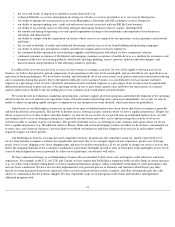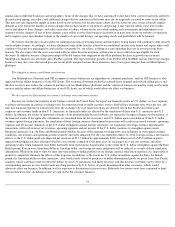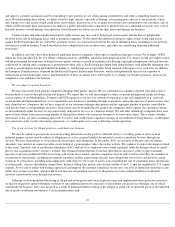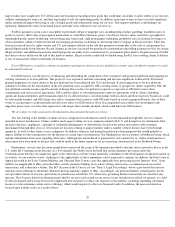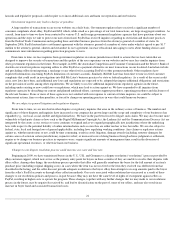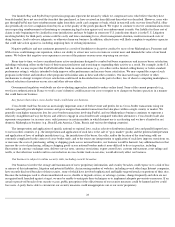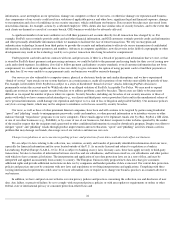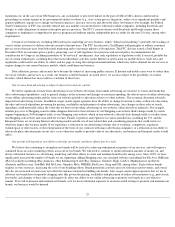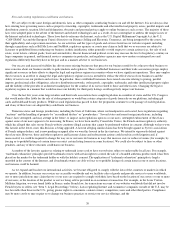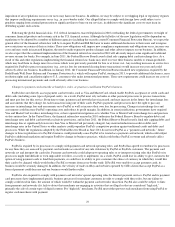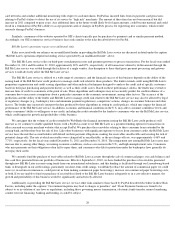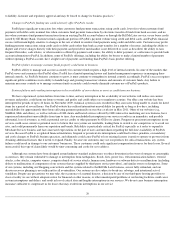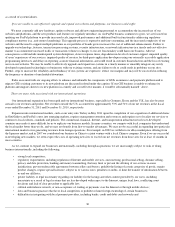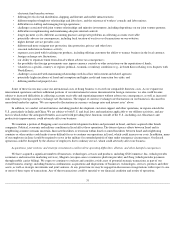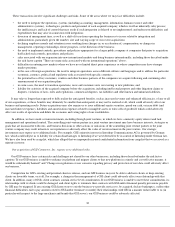eBay 2011 Annual Report Download - page 27
Download and view the complete annual report
Please find page 27 of the 2011 eBay annual report below. You can navigate through the pages in the report by either clicking on the pages listed below, or by using the keyword search tool below to find specific information within the annual report.
In the event of the bankruptcy or other business interruption of a merchant that sells goods or services in advance of the date of their
delivery or use (e.g., airline, cruise or concert tickets, custom-made goods, or subscriptions), eBay and/or PayPal could be liable to the buyers of
such goods or services, either through its buyer protection program or through chargebacks on payment cards used by customers to fund their
payment through PayPal. While we have established reserves based on assumptions and estimates that we believe are reasonable to cover such
eventualities, these reserves may be insufficient and our operating results could be adversely affected.
Failure to deal effectively with bad transactions and customer disputes would increase our loss rate and harm our business.
Over the last several years, we have enhanced the buyer and seller protections offered by PayPal in certain eBay marketplaces, and in certain
countries for transactions outside of eBay marketplaces. These changes to PayPal's buyer and seller protection program could result in future
changes and fluctuations in our Payments transaction loss rate. For the fiscal years ended December 31, 2011 and 2010, our Payments transaction
losses (including both direct losses and buyer protection payouts) totaled $246.4 million and $153.1 million, representing 0.21% and 0.17 % of
our net total payment volume, respectively. Beginning in 2009, we have also changed the dispute resolution process for transactions on eBay.com,
eBay.co.uk and eBay.de, as described in greater detail above under the caption “
Changes to our dispute resolution process could increase our costs
and loss rate,” which could result in an increase in our combined eBay and PayPal transaction losses.
PayPal's highly automated and liquid payment service makes PayPal an attractive target for fraud. In configuring its service, PayPal
continually strives to maintain the right balance of appropriate measures to promote both convenience and security for customers. Identity thieves
and those committing fraud using stolen credit card or bank account numbers can potentially steal large amounts of money from businesses such
as PayPal. We believe that several of PayPal's current and former competitors in the electronic payments business have gone out of business or
significantly restricted their businesses largely due to losses from this type of fraud. While PayPal uses advanced anti-fraud technologies, we
expect that technically knowledgeable criminals will continue to attempt to circumvent PayPal's anti-fraud systems using increasingly
sophisticated methods. From time to time, such fraudsters may discover and exploit vulnerabilities that may not immediately be identified and
remediated, which in turn may result in one-time increases in fraud and associated transaction losses. In addition, because users frequently use the
same passwords for different sites, a data breach of a third party site can result in a spike in transaction losses. Finally, PayPal's service could be
subject to employee fraud or other internal security breaches, and PayPal may be required to reimburse customers for any funds stolen as a result
of such breaches. Merchants could also request reimbursement, or stop using PayPal, if they are affected by buyer fraud or other types of fraud.
PayPal incurs substantial losses due to claims from buyers that merchants have not performed or that their goods or services do not match
the merchant's description, whether those claims arise from merchant fraud or from an unintentional failure to perform by the merchant. PayPal
seeks to recover such losses from the merchant, but may not be able to recover in full if the merchant is unwilling or unable to pay. PayPal also
incurs losses from claims that the customer did not authorize the purchase, from buyer fraud, from erroneous transmissions and from customers
who have closed bank accounts or have insufficient funds in them to satisfy payments. In addition, if losses incurred by PayPal related to payment
card transactions become excessive, they could potentially result in PayPal losing the right to accept payment cards for payment, which would
materially and adversely affect PayPal's business both on and off eBay. In the event that PayPal was unable to accept payment cards, the velocity
of trade on eBay and websites operated by GSI's clients that accept PayPal as a form of payment could also decrease, in which case our business
would further suffer. The Bill Me Later service is similarly subject to the risk of fraudulent activity associated with merchants, users of the Bill
Me Later service and third parties handling its user information. Our Payments business has taken measures to detect and reduce the risk of fraud,
but these measures need to be continually improved and may not be effective against new and continually evolving forms of fraud or in
connection with new product offerings. If these measures do not succeed, our business will suffer.
eBay faces similar risks with respect to fraudulent activities on its websites. eBay periodically receives complaints from users who may not
have received the goods that they had purchased. In some cases, individuals have been arrested and convicted for fraudulent activities using our
websites. eBay also receives complaints from sellers who have not received payment for the goods that a buyer had contracted to purchase. Non-
payment may occur because of miscommunication, because a buyer has changed his or her mind and decided not to honor the contract to purchase
the item, or because the buyer bid on the item maliciously in order to harm either the seller or eBay. In some European and Asian jurisdictions,
buyers may also have the right to withdraw from a sale made by a professional seller within a specified time period. While eBay can, in some
cases, suspend the accounts of users who fail to fulfill their payment or delivery obligations to other users, eBay does not have the ability to
require users to make payment or deliver goods, or otherwise make users whole other than through our buyer protection programs. The impact of
changes to our dispute resolutions program implemented beginning in 2009 is discussed in more detail above under the caption “Changes to our
dispute resolution process could increase our costs and loss rate.”
22



